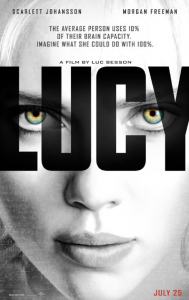film review: lucy
Director Luc Besson’s latest, Lucy, is an effort that promises more than it can deliver. Scarlett Johansson gives a commanding performance as the eponymous Lucy, a US exchange student in Taiwan who finds herself entangled in the city’s seedy underworld of drugs and violence. At the bidding of her lawless boyfriend, Richard (Pilou Asbæk), she delivers a mysterious briefcase to the apartment of the elusive Mr. Jang (Min-sik Choi), a thuggish crime lord conducting the deal of a new synthetic drug that is set to be the next big thing on the black market. Her new role as drug mule requires Lucy to transport the goods — using her body as a means of storage. When the illicit cargo seeps into her system, the consequences are dire.
The film jumps back and forth between Lucy’s chaotic ascent from student to superhuman as the drugs take effect, and a lecture delivered by Professor Samuel Norman (Morgan Freeman) pondering the possibilities of human potential if we exceeded our brain’s limits – the myth that we only access ten percent of our brains’ intellectual capacity, which has led to the theory that if we were to use more, or all, of our brain power, we could become superhuman. Although this old chestnut has long since been disproven, within the film’s logic complete cerebral control is cast as a frighteningly unimaginable feat.
Despite the presence of a female lead, the film has no reservations in stereotyping her role. Lucy’s endeavours are genderless; she seeks answers and reaps vengeance as a typical action hero would. The prospect of a female lead whose gender is a non-issue is refreshing, or at least rare, in an industry that is so heavily saturated with leading men. However, despite this promising setup, hopes are quickly dashed as the outdated premise offers no new narrative variations and quickly descends to what seems the work of only five percent cerebral capacity.
Flooded with culturally-inappropriate inaccuracies and uncalled-for racism that disregards all forms of logic, Lucy prefers to deliver astonishment through ignorance rather than enlightenment. Throughout the course of the film, Lucy’s capabilities increase, sending her to seizure-like states that signal onset of the next enhancing upgrade. But whether she’s gaining the ability to shape-shift and change her appearance or to control the actions of others, it seems her sense of basic morality is forgotten and her increasing powers give her reason to slaughter the innocent. She kills a Taiwanese taxi driver for not being able to speak English (in Taiwan!). She does battle amidst a set of culturally inappropriate backdrops – here I refer to a scene in which a set with Chinese symbols painted across it, which would certainly seem authentic to the uneducated viewer, were in actual fact random characters selected wholly for aesthetic appeal. They actually translate as “orange” and “tomato” and have no communicative value. Whatever appeal this film has, it remains a problematic viewing experience.
Min-sik Choi surprisingly – considering the little screen time he is granted – outshines Lucy’s big names, and he proves to be the film’s only redeeming element. The other characters are disappointingly two-dimensional, and both Lucy and Professor Norman simply appear and disappear throughout the patchy narrative. They fail to form any connection that would emotionally engage the audience, or invite them to sympathise with Lucy’s ill-fated situation.
The film’s dynamic action sequences (including the standard car chase) and its tendency towards gritty violence, do not excuse the feeble plot. Ordinarily the weak set-up would be forgiven by astonishingly good visual effects, but this is not the case with Lucy. Instead, you’re left aching for a thrilling montage of sight and sound throughout the mediocrity.
Lucy desperately hopes to be philosophically stimulating; it wants to question the limits of human capability, to look into the depths of the unknown and face foreign concepts. But rather than leaving you mind-boggled, you’ll be left wondering why you even bothered.
When it come to Lucy, it appears that it may be best to shut your brain down completely and use it only at minimum capacity — you are, after all, opting for a film produced with nothing more.



Pingback: Lucy – film review | anthologc